BEIJING, Dec. 30 (Xinhua) -- The Xinhua chronicle of the top 10 world news events in the year of 2019 is as follows:
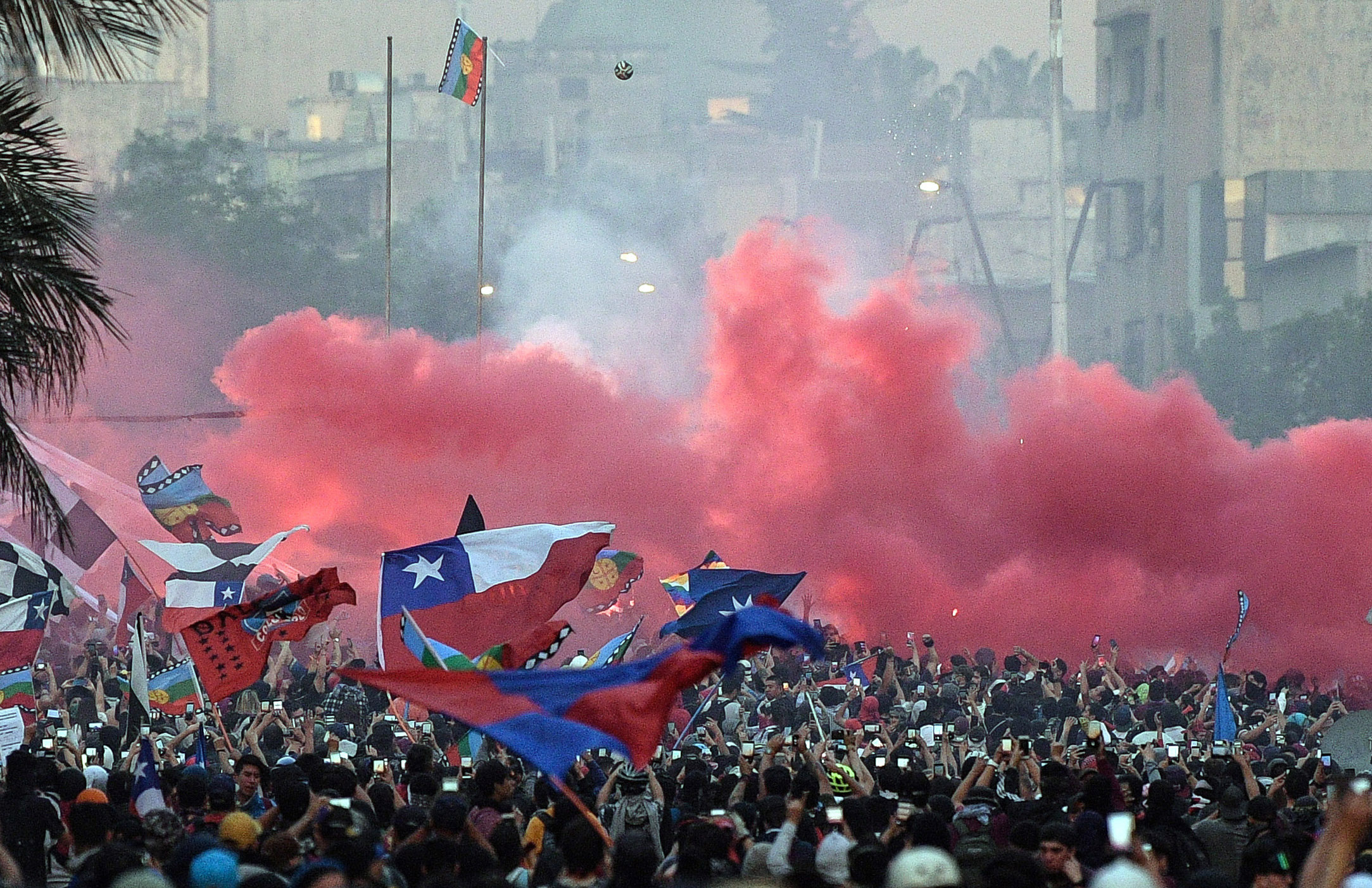
People participate in a protest in Santiago, Chile, Nov. 8, 2019. Chile has been roiled by anti-government protests since a mid-October hike in subway fares in Santiago. (Xinhua/Jorge Villegas)
Turmoil in Latin America reflects governance challenges
In January, Venezuela's opposition leader Juan Guaido declared himself "interim president" of the nation. Due to Washington's meddling, tensions in the country have increased.
In September, Peruvian President Martin Vizcarra dissolved the nation's Congress, causing a fierce confrontation between the legislature and the government.
In October, violent demonstrations erupted in Ecuador and Chile. Ecuadoran President Lenin Moreno had to move his government out of the capital to the southeastern city of Guayaquil, while Chile withdrew as the host of the Asia-Pacific Economic Cooperation summit.
At the end of October, social unrest broke out in Bolivia, and the country's President Evo Morales stepped down. In November, a national strike broke out in Colombia.
Political and social turmoil in Latin American countries reflects a trend of escalating political struggle and governance challenges.

Photo provided by the Event Horizon Telescope (EHT) shows the first image of the black hole. (Xinhua/EHT)
Global teamwork helps capture the first image of a black hole
On April 10, the Event Horizon Telescope, a planet-scale array of eight ground-based radio telescopes forged through international collaboration, captured the first image of a black hole.
The image shows a donut-like structure with a dark central region and a bright ring, which is the black hole's shadow against a disc of glowing gas that falls onto the black hole. Humans finally "saw" black holes that were once considered invisible.
More than 200 scientists participated in this program, including Chinese scientists. This is the first direct visual evidence of black holes obtained by humans, confirming that Einstein's theory of general relativity still holds in extreme conditions. This helped explore forefront issues like galactic evolution and others.

The photo released on July 21, 2019 shows the British oil tanker "Stena Impero" surrounded by speedboats of Iran's Islamic Revolution Guard Corps (IRGC) in the Strait of Hormuz, Iran. (Morteza Akhoundi/ISNA/Handout via Xinhua)
Two hot potatoes in the chaotic Middle East
Under "maximum pressure" from the United States, Iran has since May gradually stopped implementing parts of its commitment to the 2015 nuclear deal, also known as the Joint Comprehensive Plan of Action. In the meantime, a number of oil tankers have been attacked or detained in the Gulf and a U.S. drone was shot down. The U.S. side once threatened to use force against Iran.
On Oct. 7, U.S. troops started withdrawing from northeastern Syria. On Oct. 9, Turkey launched Operation Peace Spring against Syrian Kurdish People's Protection Units.
Against the backdrop of competition among major powers, hotspot issues concerning Iran and Syria have led to a more complicated situation in the Middle East. The situation in the region is likely to further deteriorate in the year to come.

Chinese President Xi Jinping and foreign leaders pose for a group photo before the opening ceremony of the second China International Import Expo (CIIE) in Shanghai, east China, Nov. 5, 2019. (Xinhua/Xie Huanchi)
China's head-of-state diplomacy opens up new horizon
In June, Chinese President Xi Jinping paid four overseas visits, setting a record in the diplomatic history of the People's Republic of China. In the year 2019, Xi has made seven overseas trips and presided over four major diplomatic events in China, which have strengthened China's relations with neighboring countries, enhanced Beijing's unity with the developing world, managed major country relations, and helped improve global governance.
As the world has been going through profound changes rarely seen in a century, China's head-of-state diplomacy has helped safeguard world peace, boost common development, and uphold multilateralism.
Over the outgoing year, the China-proposed Belt and Road Initiative has won more friends and partners, and the vision of building a community with a shared future for mankind has enjoyed growing popular support. China's image as a responsible major country has been widely recognized around the world.
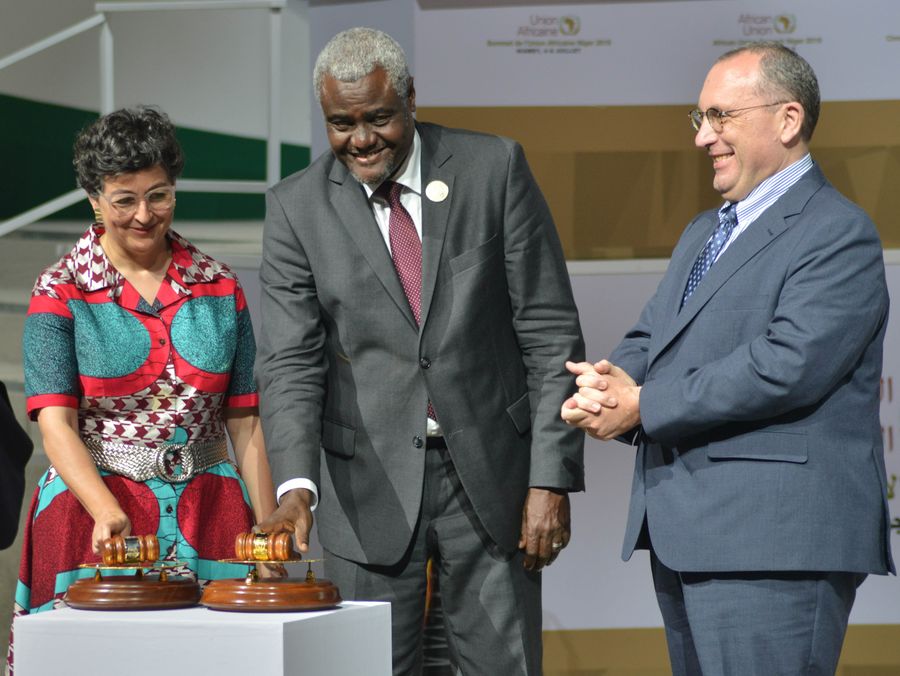
Chairperson of the African Union (AU) Commission Moussa Faki Mahamat (C) announces the operational phase of the African Continental Free Trade Area (AfCFTA) Agreement during the launching ceremony in Niamey, capital of Niger, July 7, 2019. (Str/Xinhua)
Africa launches operational phase of the AfCFTA
On July 7, African leaders officially launched the operational phase of the African Continental Free Trade Area (AfCFTA) Agreement at the 12th Extraordinary Summit of the African Union (AU) Heads of State and Government in Niamey, capital of Niger.
The AfCFTA calls for a single continental market for goods and services, with free movement of business persons and investment, paving the way for a faster establishment of a customs union. The AfCFTA covers more than 1.2 billion people with a combined gross domestic product of 2.5 trillion U.S. dollars. Fifty-four AU member countries have signed the AfCFTA, marking a milestone for African integration.
The agreement will help Africa overcome its structural problems of market fragmentation and tap the potential for economic development, reflecting African countries' will and determination to unite for self-improvement. It is of far-reaching significance to Africa's economic and social development.
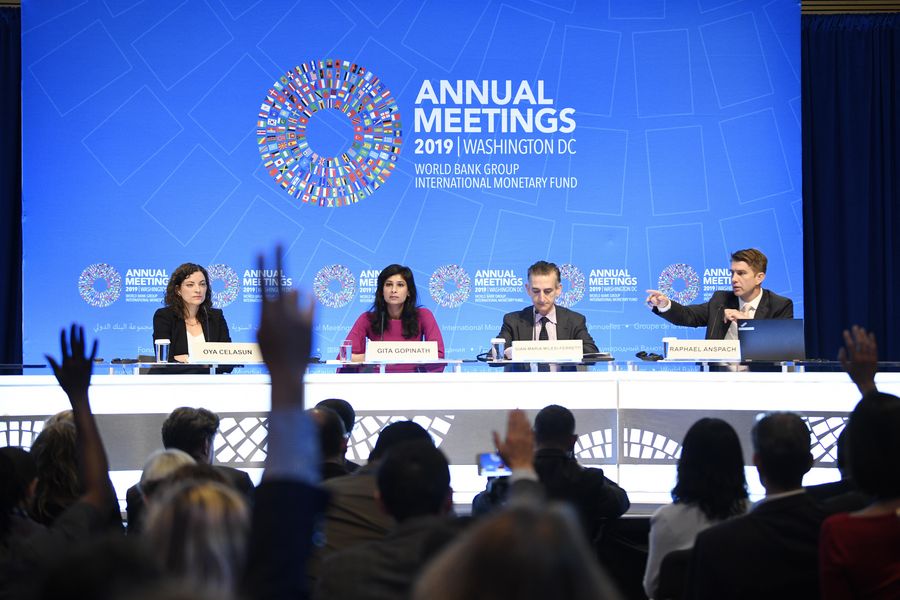
International Monetary Fund (IMF) chief economist Gita Gopinath (2nd L) attends a press conference in Washington D.C., the United States, on Oct. 15, 2019. (Xinhua/Liu Jie)
Global economic growth rate hits a decade low
The International Monetary Fund (IMF) released its World Economic Outlook report in mid-October, saying that "rising trade and geopolitical tensions have increased uncertainty about the future of the global trading system and international cooperation more generally, taking a toll on business confidence, investment decisions, and global trade."
The IMF lowered its global economic growth forecast for 2019 to 3 percent, which means that the global economic growth rate this year will reach its lowest level since the 2008 international financial crisis. However, IMF Managing Director Kristalina Georgieva said China's growth rate is still within the target range.

A staff member arranges flags of the UK and the EU before the meeting between President of the European Commission Jean-Claude Juncker and British Prime Minister Boris Johnson at the European Commission headquarters in Brussels, Belgium, Oct. 17, 2019. (Xinhua/Zheng Huansong)
Protracted Brexit reveals institutional flaws of Western democracies
On Oct. 28, the European Union accepted Britain's request for further delay of the Brexit date until Jan. 31, 2020, the third Brexit extension.
Theresa May resigned as British prime minister after her Brexit deal was repeatedly rejected by the British Parliament. Boris Johnson, May's successor, pushed for an early general election on Dec. 12 to break the Brexit deadlock.
The Conservative Party, led by Johnson, won an absolute majority in the House of Commons in the election, making the prospect of Brexit less remote.
The bruising Brexit saga reveals that British society is severely divided, that the political decision-making procedure is impotent, and that Western democracy is plagued by institutional flaws and a governance crisis.
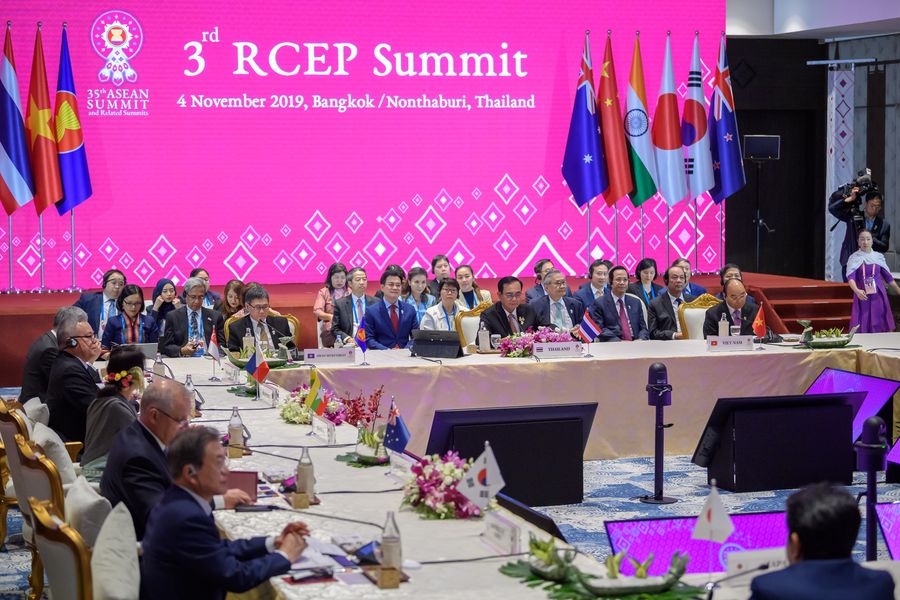
Participants attend the 3rd Regional Comprehensive Economic Partnership (RCEP) Summit in Bangkok, Thailand, Nov. 4, 2019. (Xinhua/Zhu Wei)
RCEP breakthrough boosts multilateralism
On Nov. 4, 15 participating countries of the Regional Comprehensive Economic Partnership (RCEP) said they have concluded text-based negotiations and essentially all market access issues at the third RCEP Leaders' Summit in the Thai capital city of Bangkok, which marks a huge stride in the construction of an East Asian free trade area, with the largest population, the most diversified membership structures, and the greatest potential for development in the world.
The RCEP was initiated by the 10-member Association of Southeast Asian Nations, which has invited China, Japan, South Korea, Australia, New Zealand and India to participate. India has yet to join the pact.
Despite the undercurrents of unilateralism and protectionism, the breakthrough demonstrates that multilateralism and free trade remain the predominant forces in the world.
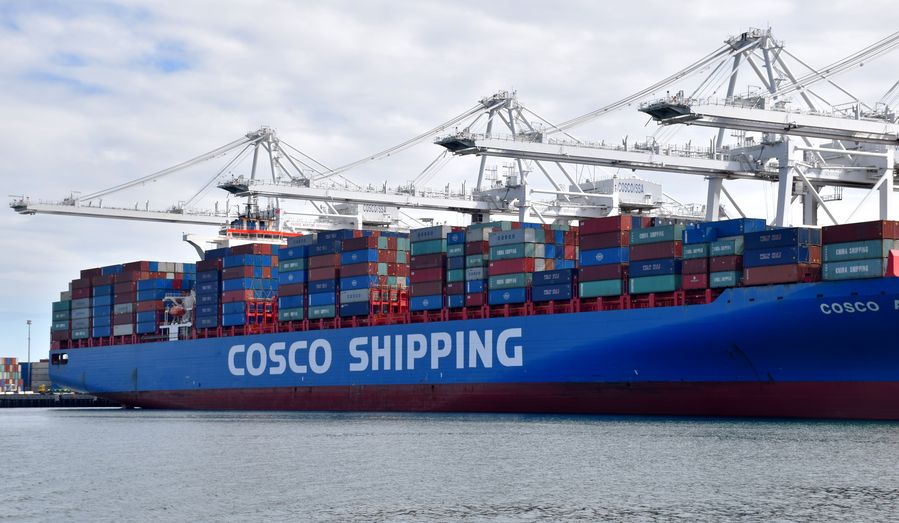
Containers of China COSCO Shipping Corporation Limited are seen at the Port of Long Beach in Los Angeles County, the United States, on Feb. 27, 2019. (Xinhua/Li Ying)
China-U.S. economic and trade consultations deliver substantial progress
On Dec. 13, the Chinese side announced that China and the United States have agreed on the text of a phase-one economic and trade agreement based on the principle of equality and mutual respect.
Over the past year, China-U.S. economic and trade consultations have gone through twists and turns. In June, the heads of state of the two countries met in the Japanese city of Osaka and agreed to restart economic and trade negotiations on the basis of equality and mutual respect. Since then, the negotiation teams of the two sides have implemented the consensus of the two heads of state and continued consultations to properly address each other's core concerns.
The easing of China-U.S. economic and trade frictions is beneficial to China, the United States and the rest of the world, and will have positive effects on such fields as economy and trade, as well as investment and financial markets.
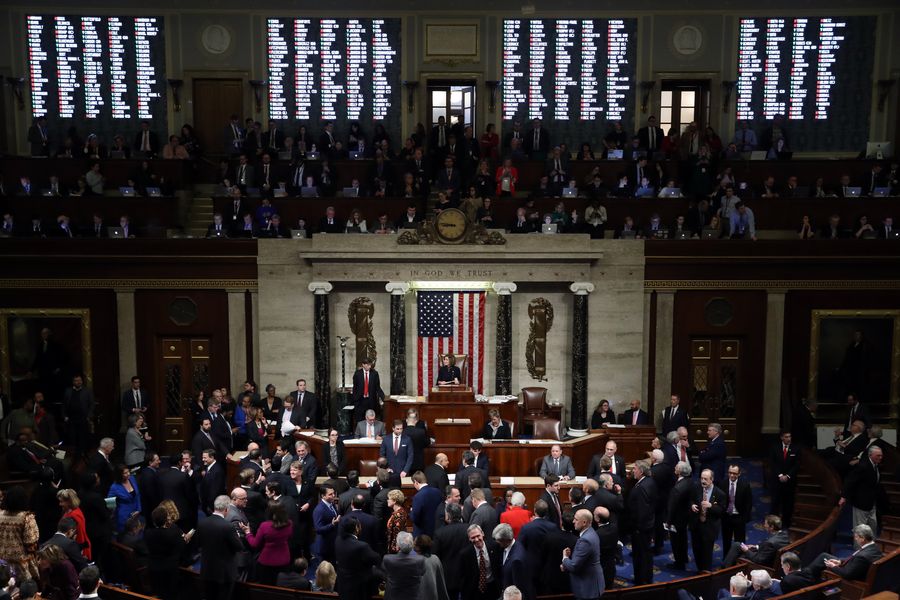
U.S. House members vote on two articles of impeachment against President Donald Trump in Washington D.C. Dec. 18, 2019. (Chip Somodevilla/Pool via Xinhua)
Trump's impeachment battle intensifies U.S. partisan conflict
On Dec. 18, the Democrat-led U.S. House of Representatives approved two articles of impeachment against President Donald Trump, accusing him of abuse of power and obstruction of Congress.
While Trump becomes the third president in U.S. history to be formally impeached, he has denied any wrongdoings and accused the Democrats of abusing power.
The impeachment, which was due to a phone call made by Trump to Ukraine's president, has become another battlefield for partisan struggle between the Democratic Party and the Republican Party, and shows that partisan conflict and political polarization have entered a new phase.
Trump's impeachment is expected to have a significant influence on the country's 2020 elections. ■



